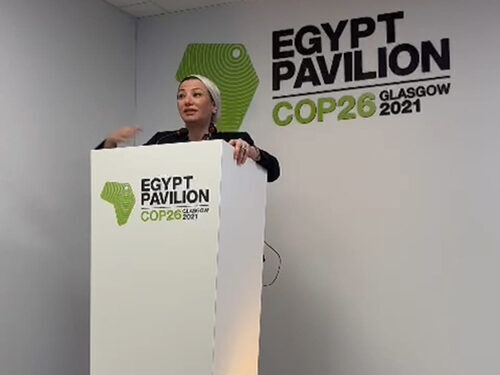
Howard: 10% of GDP globally will be in creative industries by 2030
Country Director Egypt Cluster Lead for North Africa at British Council Mark Howard said 10% ...

Egypt’s National Climate Change Strategy 2050 – launched on the sidelines of the United Nations Conference of the Parties on Climate Change (COP26) in Glasgow – targeted five main objectives, including realizing sustainable economic growth through cutting emissions of various sectors, promoting use of new energy resources, producing energy from waste and using alternative energy like green hydrogen.
The first goal aims at magnifying energy efficiency through improving efficiency of thermal energy stations, distribution networks and activities related to oil and natural gas. This goal is also meant to get consumers to depend on cleaner energy, like transportation operating by electricity or natural gas, Egyptian Environment Minister Yasmine Fouad said.
This goal is also meant to improve energy efficiency in buildings and applying the national code of green buildings, she added.
This goal also targets lowering greenhouse gas emissions in agricultural activities in addition to focusing on recycling agro-waste and ensuring safe disposal of solid waste in suitable landfills, she said.
The second goal is meant to build resilience, promote adaptation to climate change and alleviate the negative impact of climate change, through protecting citizens from negative health impact of climate change, promoting health sector to be able to confront diseases caused by climate change and preparing studies and training health sector workers.
This goal is also meant to protect natural resources and ecological systems from climate change, improve adaptation capabilities and promote adaptation methods based on linking efforts to confront biodiversity loss, climate change, land degradation, deforestation, and developing unusual water resources.
This goals is meant to maintain agricultural lands and improve crop management systems in addition to protecting fish wealth, maintaining historical and cultural heritage from the negative impact of climate change, and selecting new locations for development communities away from areas most hit by climate change impact.
The second goal also focuses on infrastructure and flexible services for confronting the negative impact of climate change, including all-out management of coastal areas, implementing flood protection systems, as well as improving sanitation and water service systems, irrigation systems and roads to be more flexible in the face of the fallout of climate change. This goal also focuses on establishing early warning system.
The third goal aims at improving good governance and business management in the fields of climate change, advancing Egypt’s international position with regard to luring more foreign investments and climate change financing opportunities.
The fourth goal aims at improving the infrastructure for financing climate activities, especially through promoting green banking activities at the local level, green credit lines and innovative financing strategies that give priority to adaptation measures such as green bonds, the private sector’s participation in financing climate action and promoting green jobs, Fouad said.
The fifth goal focuses on enhancing scientific research, knowledge management, transferring technology, and spreading awareness about climate change, especially among policy makers, citizens and students.
This strategy goes in line with the Egypt Vision 2030 which focuses on serving the United Nations Sustainable Development Goals.
The environment minister said the state will take a number of policies to implement the strategy, including the ministries’ adoption of sustainability standards and using digital solutions to cut carbon emissions.
Fouad pointed out that the climate change issue has been at the core of Egypt’s priorities since 2019 and this was manifested in the establishment of the national council for climate change under the chairmanship of the prime minister and membership of the ministries concerned.
Moreover, the Ministry of Environment prepared the Egypt National Climate Change Strategy 2050 in two phases; the framework phase approved last June and preparation of the entire strategy phase.
During the event, Ayat Soliman, the Regional Director of the World Bank Group’s Sustainable Development Department for the Middle East and North Africa (MENA), commended the Egyptian strategy which is regarded as an integrated and comprehensive measure focusing on the social and economic aspects, governmental action, financing and scientific research.
She stressed that the World Bank is gearing up for supporting Egypt in strategy priorities’ studies and offering green economic incentives.
For her part, UN Resident Coordinator in Egypt Elena Panova said Egypt prepared the strategy in a record time and the talks held with United Nations organizations addressed all supportive ideas.
She noted that international institutions will fund the strategy, noting that the UN will back the implementation of the strategy.
The strategy will enable Egypt to plan for facing and managing climate change at different levels, besides enhancing efforts to achieve the sustainable development goals in line with Egypt Vision 2030.
Country Director Egypt Cluster Lead for North Africa at British Council Mark Howard said 10% ...
Dr. Dalia El Hawary, Deputy CEO of the General Authority for Investment and Free Zones ...
The Third Egypt Business Solutions Summit – under the theme “Creativity Is The Key To ...


👍🏻